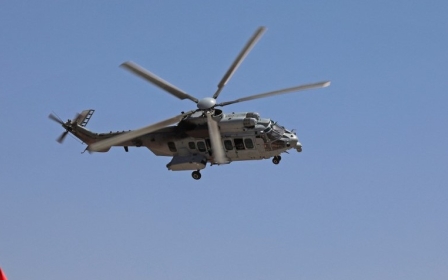Turkey elections: PKK extends ceasefire until polls close

The Kurdistan Workers’ Party (PKK) said on Tuesday that it will extend its unilateral ceasefire in its conflict with the Turkish authorities until after Turkey’s 14 May presidential and parliamentary elections.
Bese Hozat, co-chair of the armed group’s executive council, told a PKK-linked outlet that the elections had a historic importance for the “peoples of Turkey” and that the PKK had decided to maintain its “inaction” during the election period.
“We will evaluate this decision after the elections,” she said, adding that the PKK would continue to retaliate if it came under fire from Turkish forces.
The PKK, which seeks Kurdish independence, is viewed as a terror group by Turkey, the US and EU due to the deadly attacks it has launched against civilians since the 1990s.
The group has lost significant influence and presence in southern Turkey since Ankara began a new strategy to counter its fighters in northern Iraq in 2019, using sophisticated weapons such as armed drones and building dozens of outposts. The strategy cut the PKK’s access to Turkey from its main base in Iraqi Kurdistan's Qandil mountains.
Stay informed with MEE's newsletters
Sign up to get the latest alerts, insights and analysis, starting with Turkey Unpacked
Hozat also said that the PKK supports the decision by the pro-Kurdish People’s Democratic Party (HDP) not to nominate a presidential candidate. “We find the HDP’s manner important and valuable and within the scope of its principles,” she said.
The HDP, which represents more than 10 percent of the electorate and is seen as a potential kingmaker, is implicitly backing the joint opposition candidate Kemal Kilicdaroglu, chairman of the centre-left Republican People’s Party (CHP). However, it cannot officially become a member of Kilicdaroglu's Nation Alliance due to objections by Turkish nationalist and conservative parties.
The HDP is currently fighting in the Turkish Constitutional Court against efforts to close the party over alleged links to the PKK, which it denies. Its leaders decided to run its candidates for parliament under another political organisation called Green Left Party (YSP) to circumvent a possible closure ahead of the elections.
The party is in an alliance with other leftist parties, such as the Workers’ Party of Turkey (TIP) and the Labour Party (EMEP), under the name of the Labour and Freedom Alliance.
Although the HDP has been negotiating an electoral strategy to run a joint list for parliament with its allies, the TIP had been refusing to do so. Last year, the ruling Justice and Development Party (AKP) changed the electoral rules to favour larger parties and encourages smaller ones to run for parliament in joint lists.
Middle East Eye delivers independent and unrivalled coverage and analysis of the Middle East, North Africa and beyond. To learn more about republishing this content and the associated fees, please fill out this form. More about MEE can be found here.




